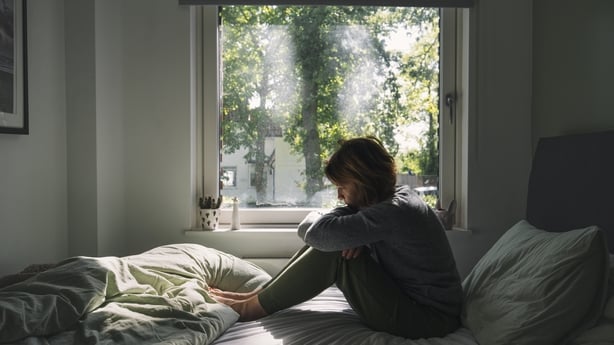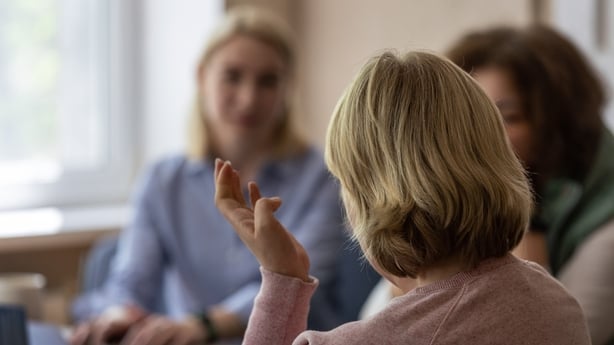Sexually violent content is shaping the sexual behaviour of adults and children in Ireland, according to research by the Sexual Exploitation Research and Policy Institute of Ireland (SERP).
The study - commissioned by the domestic violence organisation Women's Aid and funded by the Community Foundation of Ireland - reveals that much of what features in mainstream pornography constitutes sexual violence.
'Facing Reality: Addressing the Role of Pornography in the Pandemic of Violence against Women and Girls’, draws on international and Irish research.
It says the multibillion-euro business of pornography seeking to normalise extreme acts and promote the dehumanisation of women and girls.
Ireland ranks 42nd for traffic on one of the world’s most popular mainstream pornography websites Pornhub and is regularly in the top 20 for other popular porn sites.
Stripchat which describes itself as a ‘social network’ and a ‘community’ featuring free live-streamed webcam ‘performances’ is also hugely popular.
This site has ranked quite consistently in the top 20 most popular websites in Ireland for at least the past two years.

SERP says there is a significant body of research evidence demonstrating the relationship between the regular consumption of pornography and the perpetration of violence against women and girls.
The institute was commissioned by Women’s Aid to undertake the study after previous research by the domestic violence organisation showed a very high level of public concern in Ireland about the harms of pornography to gender equality, healthy sexuality, and children.
The research published today states that pornography is being accessed by both adults and children via a wide range of devices.
The devices children were using at the time they first encountered pornography included family desktops, laptop computers, personal tablets and smartphones.
We need your consent to load this rte-player contentWe use rte-player to manage extra content that can set cookies on your device and collect data about your activity. Please review their details and accept them to load the content.Manage Preferences
However, one contributor told SERP that while it is suggested that first-time access to pornography happens "once a child is given their first smartphone", the specific device/s children are using to access a whole host of harmful online content, including pornography, "is less relevant than the setting and extent of unsupervised access they may have to any internet-enabled device".
She and other contributors highlighted how parents are increasingly concerned with their children’s physical safety and may feel more comfortable when they know they are at home and "safe" in their bedrooms.
Through its research, SERP found many young people are regularly using pornography before their first ever sexual experience with another person, and this in turn is influencing expectations.
Family Psychotherapist Dr Richard Hogan described the impact of pornography to researchers he observed in his work.
"Young men come into my clinic a lot, teenage boys, trying to get off pornography. And I sit with teenage girls, and they tell me what they’ve been asked for in a relationship, and that motivates me, thinking, ‘how could this 14-year-old girl have a 14-year-old boyfriend who thought that this [violent/aggressive act during sex] was something that you do with somebody at 14 years of age?’ "
Educating children, parents, professionals and society in general about the harmful nature and impact of pornography is essential according to the report.
It also says a wider and deeper conversation is needed on the issue of sexual consent in the context of a pornography saturated culture.

While Women’s Aid has determined that mainstream pornography is providing a ‘blueprint’ for the sexual, verbal and physical abuse of women by their male intimate partners; scholars say that more research is needed to understand the complex role that pornography plays in the dynamics of domestic abuse and coercive control experienced by both women and girls in their intimate relationships.
What is clear from the research is that pornography has become "widely accepted in mainstream society", while delivering increasingly extreme and violent content.
One Irish GP recounted "multiple harms" she was witnessing in her practice, arising from pornography consumption.
"While I am a general practitioner in the true sense of the word, down here in rural Ireland I see the effects of it every week at work. With all the disclosures over the years and conversations about sexual health I definitely feel pornography and the now very visible escort service industry now informs the predator and his behaviour.
"But also, could it somehow normalise/sanitise the assault for the women themselves and create a further barrier to their addressing the violence meted upon them?," she added.
The same GP highlighted increased levels of sexual violence against young women she observed during the Covid-19 pandemic, including cases in which vulnerable young women were deceived into trusting someone and then sexually assaulted or raped by them.
She noted that none of these young women ever wanted to report these assaults, and she queried whether experiencing sexual violence had become in some way ‘normalised’ for them against the backdrop of prevalent pornography consumption.
Despite what its marketers may have the world believe, SERP says the pornography trade does not exist to provide ‘sexual liberation’, nor to ‘teach people about sex’, nor to bring ‘fun’ to people’s lives.
"It exists primarily to make money and to do so it has finely honed its business model to maximise profit at every turn," they added.
The institute has also warned that no woman or girl whose image is accessible online is immune from being targeted by exploiters using this technology due to Artificial Intelligence.
Images can be ‘nudified’ and deepfake videos are also on the rise.

A global rise in the use of AI to generate child sexual abuse material (CSAM) has also been identified, with material of increasing severity also on the rise.
The report’s authors maintain that the study demonstrates the pressing need to have a frank conversation about pornography consumption and its wider impacts on Irish society, including the reframing of the concept of ‘consent.’
Director of The SERP Institute Ruth Breslin said the research was not derived from a position that favours the censorship of erotic material, but rather from the perspective that "there is an urgent need to comprehend and address pornography for what it truly is – the sexual violence, torture and degradation of real women and girls on film".
Community Foundation Ireland CEO Denise Charlton described the research as a disturbing read, but an essential one and that gives important clarity.
"By ignoring or avoiding the issue of pornography we let our young people down by passing on a legacy of gender-based violence to a new generation. Now is the time to take meaningful action to prevent this," she said.
The Director of Women’s Aid Sarah Benson said the research was "directly relevant" to the work of the organisation, because women contacting it for support identified their partner’s use of pornography as a component of the sexual coercion and abuse, that they are enduring.
She added that pornography has "a hugely negative impact on young people and society" more generally.
"It shapes the sexual expectations of children and young people in ways that normalise harmful, coercive, dangerous, and abusive behaviours. It reinforces misogynistic and disrespectful stereotypes and undermines any educational work on consent, on safe, healthy, and respectful relationships and towards gender equality," she said.






